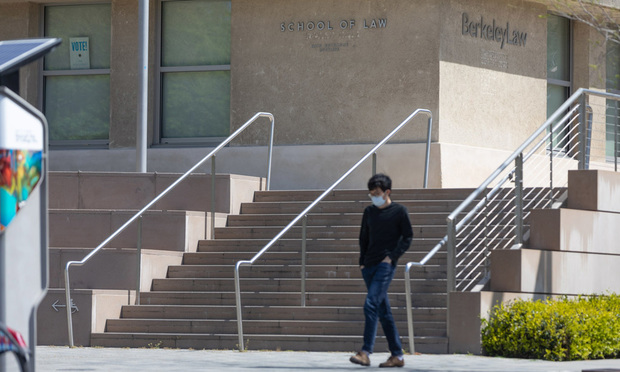With Harvard Law Remaining Online in Fall, Berkeley and Stanford Considering Hybrid Approach
With Harvard Law becoming the first to commit to remote instruction for the upcoming semester, other schools are beginning to finalize their plans for the fall.
June 05, 2020 at 03:20 PM
5 minute read
The original version of this story was published on Law.com
 Outside University of Califonria, Berkeley School of Law on April, 13, 2020 under the statewide shelter-in-place order Photo: Jason Doiy/ALM
Outside University of Califonria, Berkeley School of Law on April, 13, 2020 under the statewide shelter-in-place order Photo: Jason Doiy/ALM
Harvard Law School late Wednesday announced that fall classes will be fully online in light of the COVID-19 pandemic—making it the first top law school to confirm that it won't be returning to campus next semester.
"This is not the announcement we'd hoped to make," wrote Dean John Manning in a message to students. "But our first priority is, and must continue to be, the health and safety of our community, and we cannot reliably conclude at this time that we can safely provide an effective on-campus program this fall."
The move was not entirely unexpected. Several other graduate programs at Harvard announced similar moves earlier in the day. But it remains to be seen whether other law campuses follow suit—as Harvard Law is arguably the country's most prominent law school.
At California's top-ranked law schools, Stanford Law School and the University of California, Berkeley School of Law, plans are underway for a mix of online and in-person instruction in the fall.
Stanford Law School Dean Jenny Martinez announced Wednesday that the school's priority will be keeping students, faculty and staff safe. The school is planning for a hybrid model of in-person classes and activities depending on public health conditions. The fall quarter for Stanford Law's 2Ls and 3Ls will begin Sept. 14, while the school is still reviewing start date options for 1Ls and LL.M.s. Martinez also announced that all classes will end before Thanksgiving and finals will be administered online.
On Thursday, Berkeley Law Dean Erwin Chemerinsky sent a message to the law school community saying that the university's chancellor and provost had indicated that they were planning to finalize plans for the fall by mid-June. Chemerinsky said the officials had told the school's deans that although most instruction would remain online, they had expressed a "strong desire for some degree of in-person classes in the Fall."
"Under their proposed approach, some classes under 25 students will be able to meet in person if there is classroom space that can be safely used, but large classes will be taught online or with in-person groups of 25 or less," Chemerinsky wrote.
Chemerinsky indicated that students and faculty would be required to maintain social distancing and wear masks while in school buildings and that facilities would undergo frequent cleanings, including between classes.
"We have submitted to campus a plan that would prioritize in-person instruction for first year students and for upper-level classes that have under 25 students or that will meet with under 25 students in the room at a time with others participating remotely," the dean wrote. "Our plan would try to provide all first-year students the option for some in-person instruction, though most would need to be done remotely."
The dean indicated that most upper-level classes would need to be provided remotely, because of a lack of classroom space to accommodate social distancing. Chemerinsky also indicated that all faculty and students will have the option of participating remotely for in-person classes if they choose. "We will do all we can to ensure that no one feels pressure to come in person and that no one is disadvantaged by not being here in person," he wrote.
In his Wednesday note, Harvard's Manning wrote that while the public health situation could improve to allow for more in-person interaction next semester, the school needed to reach a decision so that students and incoming students can plan accordingly. With classes held online, it's unnecessary for students to relocate to Cambridge, Massachusetts, for instance. (A reduced number of law school dorm rooms will be available for students whose home environment is not conducive to learning for technology or other reasons.) And the law school is allowing current students to take a leave of absence if they so choose, and for admitted students to defer their start in light of the change. Incoming J.D. and LL.M. students have until June 19 to make deferral decisions.
"The Harvard Law School faculty is already hard at work adapting their teaching plans in order to offer the best online courses and clinics possible," Manning wrote. "In order to be prepared in the event it proved necessary again to teach and learn online, we have been busy, in recent weeks, studying and absorbing the latest research about how students best learn online and identifying the range of tools, techniques, and approaches that create excellent, engaging online courses."
Harvard Law is looking for avenues to foster student connections and keep extracurricular activities going while remote, Manning added. Incoming students and foreign students will meet in small groups prior to the start of classes, according to the message.
The law school also posted a list of frequently asked questions, clarifying that it has set aside $1 million to help students with internet access and technology issues. Tuition for next year will remain at the 2019 rate: $65,875.
Harvard was among the many law schools that abandoned its usual grading system in favor of pass/fail grading during the spring semester, but the upcoming fall semester will see a return to the normal grading scheme. And most clinics will be able to operate in a remote capacity.
"While we will keep you apprised as we learn more, we must now turn our focus fully to developing the best, most robust, highest-quality online academic, clinical, and extracurricular programming we can for the coming term," Manning wrote.
This content has been archived. It is available through our partners, LexisNexis® and Bloomberg Law.
To view this content, please continue to their sites.
Not a Lexis Subscriber?
Subscribe Now
Not a Bloomberg Law Subscriber?
Subscribe Now
NOT FOR REPRINT
© 2025 ALM Global, LLC, All Rights Reserved. Request academic re-use from www.copyright.com. All other uses, submit a request to [email protected]. For more information visit Asset & Logo Licensing.
You Might Like
View All

'A Never-Ending Nightmare': Apple Sued for Alleged Failure to Protect Child Sexual Abuse Survivors

'The Hubris of Big Tech': Apple Hit With California Labor Lawsuit for Alleged Free Speech, Privacy Violations

Jury Says $118M: Netlist Wins Another Patent Verdict Against Samsung
4 minute readTrending Stories
Who Got The Work
Michael G. Bongiorno, Andrew Scott Dulberg and Elizabeth E. Driscoll from Wilmer Cutler Pickering Hale and Dorr have stepped in to represent Symbotic Inc., an A.I.-enabled technology platform that focuses on increasing supply chain efficiency, and other defendants in a pending shareholder derivative lawsuit. The case, filed Oct. 2 in Massachusetts District Court by the Brown Law Firm on behalf of Stephen Austen, accuses certain officers and directors of misleading investors in regard to Symbotic's potential for margin growth by failing to disclose that the company was not equipped to timely deploy its systems or manage expenses through project delays. The case, assigned to U.S. District Judge Nathaniel M. Gorton, is 1:24-cv-12522, Austen v. Cohen et al.
Who Got The Work
Edmund Polubinski and Marie Killmond of Davis Polk & Wardwell have entered appearances for data platform software development company MongoDB and other defendants in a pending shareholder derivative lawsuit. The action, filed Oct. 7 in New York Southern District Court by the Brown Law Firm, accuses the company's directors and/or officers of falsely expressing confidence in the company’s restructuring of its sales incentive plan and downplaying the severity of decreases in its upfront commitments. The case is 1:24-cv-07594, Roy v. Ittycheria et al.
Who Got The Work
Amy O. Bruchs and Kurt F. Ellison of Michael Best & Friedrich have entered appearances for Epic Systems Corp. in a pending employment discrimination lawsuit. The suit was filed Sept. 7 in Wisconsin Western District Court by Levine Eisberner LLC and Siri & Glimstad on behalf of a project manager who claims that he was wrongfully terminated after applying for a religious exemption to the defendant's COVID-19 vaccine mandate. The case, assigned to U.S. Magistrate Judge Anita Marie Boor, is 3:24-cv-00630, Secker, Nathan v. Epic Systems Corporation.
Who Got The Work
David X. Sullivan, Thomas J. Finn and Gregory A. Hall from McCarter & English have entered appearances for Sunrun Installation Services in a pending civil rights lawsuit. The complaint was filed Sept. 4 in Connecticut District Court by attorney Robert M. Berke on behalf of former employee George Edward Steins, who was arrested and charged with employing an unregistered home improvement salesperson. The complaint alleges that had Sunrun informed the Connecticut Department of Consumer Protection that the plaintiff's employment had ended in 2017 and that he no longer held Sunrun's home improvement contractor license, he would not have been hit with charges, which were dismissed in May 2024. The case, assigned to U.S. District Judge Jeffrey A. Meyer, is 3:24-cv-01423, Steins v. Sunrun, Inc. et al.
Who Got The Work
Greenberg Traurig shareholder Joshua L. Raskin has entered an appearance for boohoo.com UK Ltd. in a pending patent infringement lawsuit. The suit, filed Sept. 3 in Texas Eastern District Court by Rozier Hardt McDonough on behalf of Alto Dynamics, asserts five patents related to an online shopping platform. The case, assigned to U.S. District Judge Rodney Gilstrap, is 2:24-cv-00719, Alto Dynamics, LLC v. boohoo.com UK Limited.
Featured Firms
Law Offices of Gary Martin Hays & Associates, P.C.
(470) 294-1674
Law Offices of Mark E. Salomone
(857) 444-6468
Smith & Hassler
(713) 739-1250






